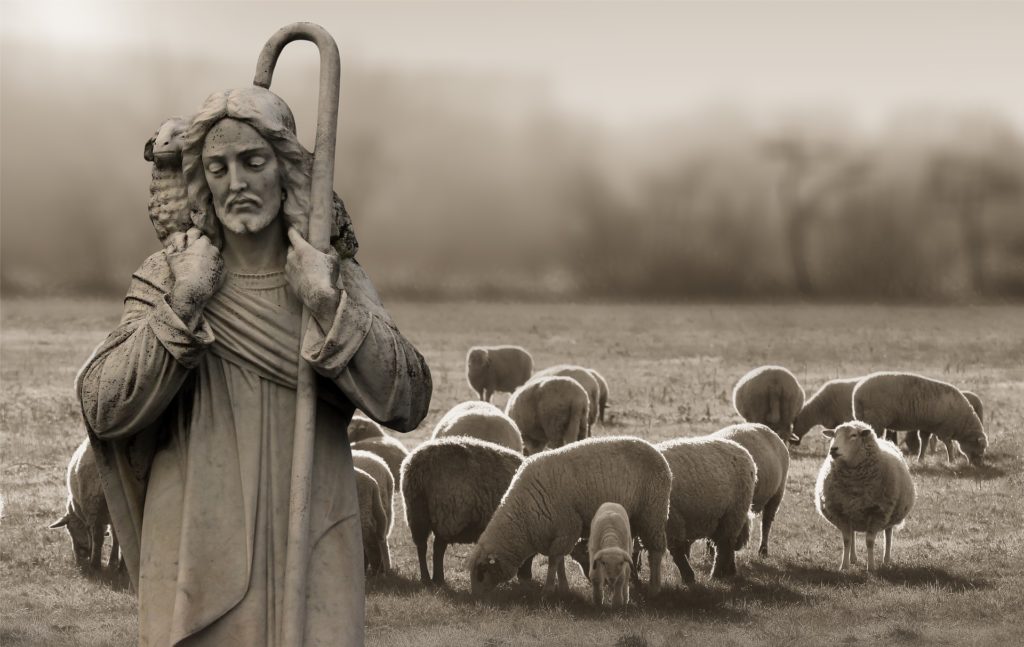
The Good Shepherd (John 10:11-18)
“The LORD is my shepherd, I shall not want.” Those words have provided comfort for many.
Yet, the whole truth is that Jesus is the “good” shepherd. “Good” here carries the idea of “noble” or “worthy.” Hence, Jesus is the “noble” shepherd.
Let’s look and see how Jesus is the good shepherd.
The Good Shepherd would:
Breathe His Last for the Sheep, vv 11-13
The good shepherd gives his life for the sheep.
A good shepherd is willing to give his life for the sheep. Such sacrifice is often necessary for shepherds. David killed both lion and bear when they attacked his sheep (1 Sam. 17:34-36). A shepherd would rescue from the mouth of a lion “two legs or a piece of an ear” (Amos 3:12).
This sacrifice is “for” the sheep, i.e., on their behalf. Jesus died for us because we couldn’t save ourselves (Is. 53:5).
The hireling does not lay down his life for his sheep.
The hireling does not own the sheep—it’s no skin off his teeth if they get killed. The hireling sees the wolf coming and flees. The hireling is concerned about himself, not the sheep. The wolf comes and destroys the sheep.
The hireling doesn’t care for the sheep. He has demonstrated his lack of concern for the sheep by fleeing. Jesus, on the other hand, does care for the sheep.
Jesus was willing to lay down his life for the sheep (Matt. 20:28).
Befriend His Sheep, vv 14-15
The good shepherd knows his sheep. The good shepherd knows his sheep by name (Jn. 10:3). “The Lord knows those who are his” (2 Tim. 2:19). The Lord knows you, and the Lord cares about you.
The good shepherd is known by his sheep. The sheep know the good shepherd’s voice and they follow him (Jn. 10:4). If we know Jesus, we follow him.
The good shepherd knows the Father and is known by the Father. This shows a level of intimacy between the Father and the Son. This intimacy is the basis of our relationship with Jesus.
Bring Together His Sheep, v 16
He has sheep which are not of this fold. “This fold” clearly refers to the Jews. Therefore, these other sheep are clearly Gentiles.
The good shepherd will bring them in. These other sheep will hear the shepherd’s voice. There will be one flock and one shepherd.
The Old Testament said that Gentiles would be accepted into God’s plan. Jesus would be a “light to the Gentiles” (Is. 42:6). Many nations would come into the church (Mic. 4:1-5).
Had Jesus not brought in the Gentiles, we would have no hope.
All of this:
Benefits Him, vv 17-18
The Father loves the good shepherd.
The Father loves him because he lays down his life. The Father is pleased with the shepherd.
No one takes the good shepherd’s life. He voluntarily lays it down (Matt. 26:53).
The good shepherd also has power to take his life back up as the Father gave him commandment.
Jesus had the power to take his life back up again. Jesus was raised back to life. Because Jesus was raised back to life, we shall be resurrected (1 Cor. 15:22-23).
Jesus had received this from the Father. Jesus obeyed the Father (Phil. 2:8). Because Jesus obeyed the Father, we can have eternal life.
Jesus is the good shepherd, and he loves us dearly. Won’t you return that love?
This sermon was originally preached by Dr. Justin Imel, Sr., at the Alum Creek church of Christ in Alum Creek, West Virginia.





